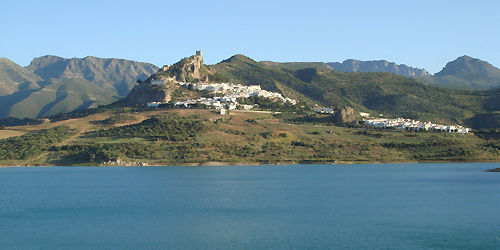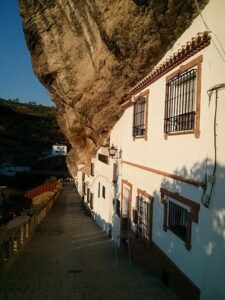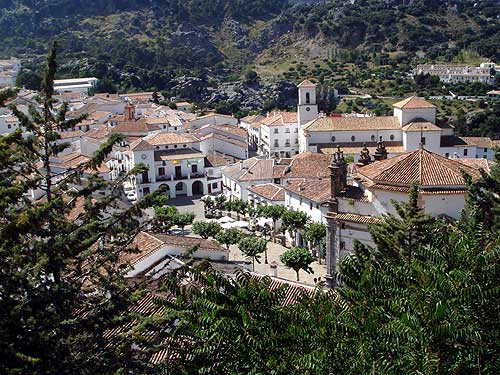If you are visiting Cádiz, then it is highly likely that you will want to also get out and about a bit. The Pueblos Blancos (known as the White Villages) make up a scenic route that winds through many of the characteristic white-washed villages of the province of Cadiz (and Malaga.) Visiting the Pueblos Blancos (White Villages) from Cádiz

The route begins in Arcos de la Frontera, a town perched on a rocky hill overlooking the Guadalete River. From there, travelers can explore a string of picturesque villages such as Algar, Espera, Bornos, Prado del Rey, Villamartin, Puerto Serrano, Algodonales, Torre Alhaquime, Olvera, Alcala del Valle, El Gastor, Setenil, Grazalema, Zahara de la Sierra, Benaocaz, Ubrique, Villaluenga del Rosario and el Bosque.
In short, the Pueblos Blancos route offers a unique opportunity to discover the hidden gems of the province of Cadiz, where history, culture, and natural beauty come together in a truly magical way.
Viator have a large selection of trips from Cádiz to the white villages and other nearby places
Guided Tours for visiting the Pueblos Blancos (White Villages) from Cádiz
Below are some guided trips from Cádiz to visit the Pueblos Blancos.

The villages are named after their distinctive white-washed houses, castles, and churches that create an enchanting sight against the backdrop of the green and brown countryside.
The white color of the buildings is not just for aesthetics; it also serves a practical purpose. The white paint reflects the sun’s rays, keeping the houses cooler during the hot summer months. The houses are constantly “repainted” to maintain their immaculate appearance, which has become a point of pride for the locals.
Aside from the charming architecture, the Pueblos Blancos route offers a variety of cultural and natural attractions.
The villages are situated in the heart of the Sierra de Grazalema Natural Park, which is home to a rich array of flora and fauna, including many bird species and Spanish ibex. Travelers can explore the park’s hiking trails, go birdwatching, or simply soak up the breathtaking views.

Driving the Pueblos Blancos (White Villages) from Cádiz
The route also features historical landmarks such as the Castillo de Arcos de la Frontera, a Moorish castle dating back to the 11th century, and the Cueva de la Pileta, a prehistoric cave with ancient rock paintings. Visitors can also sample the region’s traditional cuisine, including local wines and dishes made with fresh, locally-sourced ingredients.
For maps and more information about Driving the Pueblos Blancos (White Villages) from Cádiz see the great page at the Grazalema Guide: https://grazalemaguide.com/blog/the-white-villages-of-the-sierra-de-grazalema/
FAQ: Visiting the Pueblos Blancos (White Villages) from Cádiz
The Pueblos Blancos, or White Villages, are a scenic collection of white-washed towns found primarily in the province of Cádiz, with a few extending into Málaga. These villages are scattered across the Sierra de Grazalema Natural Park, offering stunning views, historical architecture, and a strong sense of local tradition.
The white façades of the Pueblos Blancos serve both practical and aesthetic purposes—and have a fascinating historical function as well.
Cooling effect: The whitewash reflects sunlight, helping to keep houses cooler during the scorching Andalusian summers. This was especially valuable before the advent of modern air conditioning.
Visual charm: The bright white buildings stand out beautifully against the natural backdrop of green hills and rocky terrain, creating the iconic look that gives the villages their name.
Cultural pride: Locals repaint their homes regularly to maintain their immaculate appearance. It’s not just a tradition—it’s a point of pride in these communities.
Historical hygiene: Perhaps less known is the fact that lime-based whitewash (cal or cal viva) was historically used as a natural disinfectant. During outbreaks of diseases like cholera and the plague, communities applied limewash to walls, wells, and streets to help sterilize surfaces and prevent the spread of illness. The antibacterial properties of lime made it a valuable tool in public health long before modern sanitation practices were widespread.
This combination of climate adaptation, cultural tradition, visual identity, and historical hygiene gives the white villages their distinctive character and lasting appeal.
This route is described as a “magical experience” because it blends history, culture, and nature in a unique way. From Moorish castles and prehistoric caves to charming village streets and local cuisine, the route reveals the hidden gems of the province of Cádiz.
The route usually begins in Arcos de la Frontera and includes picturesque villages such as:
Zahara de la Sierra
Setenil de las Bodegas
Grazalema
Olvera
El Bosque
Ubrique
Benaocaz
Villaluenga del Rosario
Algodonales, and many more.
Each village has its own charm, but Zahara de la Sierra and Setenil de las Bodegas are often highlighted for their dramatic settings and unique architecture.
There’s more than just white-washed houses:
Hiking & birdwatching in Sierra de Grazalema Natural Park
Spotting wildlife like the Spanish ibex
Exploring Castillo de Arcos de la Frontera (11th-century Moorish castle)
Visiting Cueva de la Pileta, a cave with ancient rock art
Enjoying traditional Andalusian cuisine and wines made from local ingredients
There are two main ways:
Guided Tours – Companies like Viator offer full-day trips with transport and guides.
Self-Drive – Rent a car and follow the route yourself. Begin in Arcos de la Frontera and explore at your own pace.
For maps and driving tips, see:
The Grazalema Guide – White Villages
Yes. Most guided tours cover 2–4 villages in one day. If you’re driving, you can tailor your route and even consider staying overnight to enjoy the evening ambience of the villages.
The villages lie within the Sierra de Grazalema Natural Park, one of Spain’s most ecologically diverse areas. The park is named after the village of Grazalema.
Spring and autumn offer the best weather—cool enough to explore comfortably and ideal for nature walks. Summer can be very hot, especially inland.
I’ve been living in this lovely area of Western Andalucia for the last 20 years or so and dedicate most of my time to the running of English language tourist information websites for the towns of Cádiz, Ronda, Grazalema, the famous or infamous Caminito del Rey, and also Wildside Holidays, which promotes sustainable and eco-friendly businesses running wildlife and walking holidays in Spain. My articles contain affiliate links that will help you reserve a hotel, bus, train or activity in the area. You don’t pay more, but by using them you do support this website. Thankyou!
